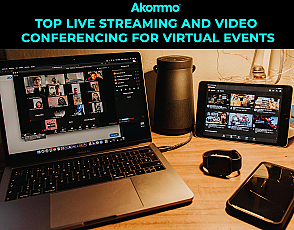
Top Eco-Friendly Hotels in Europe for Sustainable Business Travel
Eco-tourism, a rapidly growing sector within the global tourism industry, is making significant strides toward sustainab...
Organising an event during the Coronavirus (COVID-19) outbreak could be dangerous if not planned and managed carefully. As an event organsing company, we want to help you to take the necessary measures in order to run a smooth event.
All this measures are based on the World Health Organization's Key planning recommendations for Mass Gatherings in the context of the current COVID-19 outbreak
One of the most important points when organising an event in the coming period is to establish a direct link with local and national health authorities. It's highly recommended that a person in the event organising comitee is appointed as being responsible for contacting the health authorities. The information should be public and shared and the contact among the event organisers and the health institutions should be uninterrupted.
The details of the communication strategy and details among both parties must be discussed in advance and planned within a reasonable period of time, so all potential scenarios can be evaluated and studied. Also, which communication channels will be used must be clarified in advance and all personnel that will be involved in the communication flow at any capacity must be correctly informed and notified of any major and minor adjustments.
If an event is actually going through, getting cancelled, modified or postponed, it must be decided through risk assessment. Each event organising board, in partnership with the appointed national and local health authorities, must trace a plan with all the potential risks that can arise from a massive gathering.
The final decision must be taken in accordance with the health authorities related to the case and always looking out for the well-being of exhibitors, clients, partners, attendees and locals. For high-visibility or large events, the World Health Organization can provide advice and technical support to the organising committee while assessing the public health risk that can be associated with the event in case of going through with the scheduled dates.
When communicating the risks of an event that will entail mass gatherings, the following measures should be considered:
- Key messages for the local population and event participants must be coordinated and consistent and consideration should be given to how messages about risk can be delivered to the population and to participants quickly if an unusual event occurs.
Messaging should include:
- Overall assessment of the local risk.
-Advice on preventive measures, especially respiratory etiquette and hand hygiene practices.
- Advice about how to access local health care if necessary, including how to do so without creating a risk to healthcare workers.
- Advice on self-isolation and not attending the event if symptoms develop.
-Information about disease's signs and symptoms, including warning signs of severe disease that require immediate medical attention.
-Advice on self-monitoring for symptoms and signs for participants travelling from affected countries, including checking their temperature.
-Wearing a face mask will depend on each country and their policies, so be sure to comply.
In case that either the event organisers or the public health authorities feel like specific information needs to be shared in order to prevent potential risks, it must be correctly communicated to everyone involved.
The rise of the Coronavirus was a rapid one, so at the moment there's no published experiential data regarding mass gatherings during the current outbreak. However, arrangements must be planned in order to ensure a smooth running of the event and a clear communication between organisers and health authorities.
If any of the parties involved feels like more specific measures shall be taken into consideration, they should implement them in partnership with the health authorities, but the original action plan should contain:
-Regular and full sharing of information by organisers and public health authorities.
-Arrangements to provide participants with information about how to access health advice.
-Arrangements for ongoing, dynamic risk assessments to be conducted by the public health authority and organisers as the event progresses.
-Arrangements for communicating with participants and the local population to ensure messaging is consistent.
The fact that isolation facilities may be needed at some point during the event, obliges event organisers to consider the need to provide the needed facilities for health assessment. This would be achieved faster and more effectively if the event provides its own medical services rather than depending on the local health service. Providing isolation facilities entails having healthcare workers, infection control, prevention measures and protective equipment to be used by the staff.
If a participant of the event feels unwell and the symptoms are COVID-19-like, it must be previously considered by the organisers how he or she will be transported to the treatment facilities. However, this is likely to be in a national health facility where there is appropriate containment capacity and expertise, so participants will not be able to remain in the event's medical facility.
After the gathering, if public health authorities suspect that transmission of the COVID-19 virus has occurred, organisers and participants should support the response of authorities.
Once the event goes through as scheduled, organisers and health authorities must keep on cooperating to eliminate any suspicion of COVID-19 transmission.
-Meeting organisers must liaise with public health authorities and facilitate the sharing of information about all symptomatic participants (such as their itineraries, contact information, visa procedures, hotel bookings).
- Individuals who develop symptoms during the mass gathering and their stay in the country should isolate themselves, seek medical attention and inform the appropriate public health authorities about their potential exposure, both in the country where the event was held and upon returning to their country of residence.
- It may be necessary both for clinical reasons and under International Health Regulations to notify the home countries of returning participants of any people who developed COVID-19 infection while attending the event.
- Organisers also need to ensure that test results reported after the event are notified to the participant and, possibly, to the home country’s public health system.
Browse the latest tips, tricks, & venue updates from Akommo

Eco-tourism, a rapidly growing sector within the global tourism industry, is making significant strides toward sustainab...

Never, in the history of the world, have we been so dependent on technology. The pandemic has forced us to rely more hea...

Jason Greenman - CEOMental Health:He just finished reading Atomic Habits, an inspiring book that encourages you to imple...

The MICE (meeting, incentives, conferences, and exhibitions) and hospitality industries have been two of the hardest hit...

We are facing a global pandemic that is affecting the lives of everybody on the planet. Most of us have been confined to...